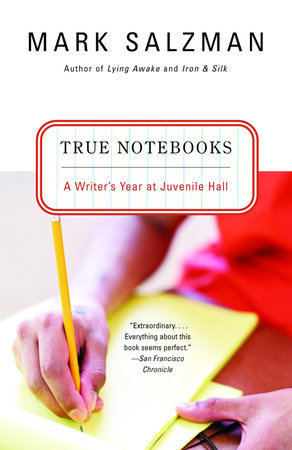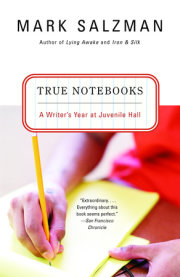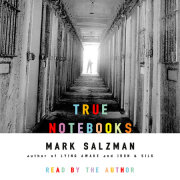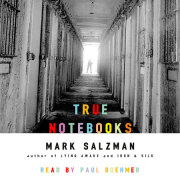1.
Somebody
Mr. Jenkins unlocked the bolt and pushed the steel-frame door to K/L unit open with his shoulder.
"Look who's back. Nice trip?"
"Very nice." I had just returned from my sister's wedding in Connecticut. "Did we lose anybody while I was gone?"
"Paulino's in the Box, but he'll be back."
"Hey Mark! Whassup?"
Three of the boys in my juvenile hall writing class were already in the library, their folders and notepads spread out on the table. Toa, a seventeen-year-old Samoan with a linebacker's build, stepped forward and gave me a hug. "So you bring us any maple syrup, or what?" he asked.
"Maple syrup?"
"I know 'bout that 'cause a watchin' Mr. Rogers when I was a kid."
Raashad's eyes opened wide. "You seen that show too?"
"Every kid seen that show, fool. Nothin' else to do in the mornin' 'cept break toys an' shit."
"Yeah, I was always like, where that neighborhood at? Nobody got drunk or beat his ass or nothin'."
"Yeah," Toa said, "but check it out: that show be fake. Know how I figured it out? People always be walkin' in and outta his door and he never locked it. He'd'a had all his shit jacked if it was real."
"Yeah! Homies be like, 'It's a beautiful day in the neighborhood--now gimme that train set, fool.'"
"So how was your sister's wedding?" Antonio asked me as I handed out pencils.
"Beautiful. Perfect weather, too."
"Any fights break out?" Toa asked.
"At the wedding?"
"Nah, at the reception."
"No, no fights. Where are the rest of the guys?"
"The chapel. They got some kinda meditation retreat over there this morning. Could you gimme another pencil, Mark? This one don't got no eraser."
Toa frowned. "'Cause you bit it off, fool. I just seen you."
"I didn't bite nothin' off. It was already gone, I was just chewin' on the metal part."
"I went to that meditation thing once," Antonio said. "I went 'cause I heard the instructor was this hot female, but then I got there and it was some bald guy in a robe playin' a harmonica. Fuck that."
Raashad checked the eraser on his new pencil, then said, "Yeah, you suppos'ta close your eyes an' picture yourself goin' down some stairs into your workshop in the cellar where you got all yo' tools."
"Your tools?"
"Yeah, 'tools for life.'" Raashad rolled his eyes. "You suppos'ta choose what tools you need and put 'em on your belt, like you some kinda superhero. First of all, I say to myself: What nigga you know got a workshop? What nigga you know got a cellar? Right off I knew this shit ain't for me."
We joked around for a while, talked about a former class member who had just been sentenced to fifty years to life, then the boys settled down to write. After forty minutes, when they had all written something, I asked who would like to read aloud first.
"Let Carter start," Antonio said. Although I addressed them by their first names, the boys followed the example of the staff and referred to each other by last name only. "Carter got some good news last week."
Raashad nodded, propped his notepad on one knee, and read:
At about 2:33 a.m. the night staff came to my door and unlocked it. The sound of the key turning woke me up immediately, that sound always wakes me up alarmingly. The staff said, "Hey Carter, get up." I said, "Man what the hell." He said telephone. The first thing I thought was it was the police telling me someone in my family was dead. As I'm walking to the phone my heart was beating extremely hard like if you could see it beating through my shirt. When I picked up the phone I was relaxed by the sweet soothing sound of my companion and fiance Amika telling me she just gave birth to a little girl. The feeling inside me was indescribable. It was amazing, she said she weighed in at 8 lbs 4 oz. I felt so happy my body felt so numb. I was astounded by the information I had just received. I feel so great. Ever since that day I've been happy and just waiting to see her. I heard her giggle on the phone the feeling was great. I can't wait until the day when I can hold my daughter.
"Congratulations," I said.
He half smiled. "I'm pretty excited about it. I just pray to God I win my case so I can get out soon."
Toa volunteered to read next, promising to take everyone's mind away from prison and back to the freedom of "the outs."
My family weddings are cool and all but my family can't get along. During the wedding it's cool and all but the party that's after it ain't nothin' nice. It's like warfare. As soon as they down a few cases everybody all of a sudden feels like Superman. For example my cuzzin's wedding was beautiful, everything's going smooth, even the party until my brothers showed up. Apparently my brother had shot one of the groom's cuzzins and he was paralyzed. And the best man was that fool's older brother. They weren't trippin' but my brother was. He banked the best man up on the dance floor in front of everybody. People was already drunk and shit so they start jumpin' in wanting to scrap too. My stupid ass cuzzin threw a chair in the crowd and it hit this old man. Everybody stopped right then and there because the old man was the priest. The priest's son started trippin' so we fucked that punk up in the parking lot. That's why I kinda hate family weddings.
As promised, the essay took Raashad's and Antonio's minds off their surroundings. They compared stories of family gatherings that had turned into brawls until we had only five minutes left for class, then Antonio read last.
I am lying in my room incarcerated at Central Juvenile Hall looking at the white painted walls in my room, and how my door is shut with a steel bolt lock to show that I am locked up. It's weird but this room relates to my life I once lived outside, over the walls laced with barbed wire. I was locked in a world where nothing would come in and nothing would go out. I was trapped in my gang life, that's all I knew and all I wanted to know. I chose to stay in my room and not let anybody control me. I had too much pride to open my door and let somebody in. I neglected the people who really cared about me, my family and my loved ones. Sure, at the time it was all fun, but was the consequences really worth it? To me, no, but I was the steel bolt that kept myself from realizing that the world is a lot bigger than a room (my gang). There are a lot more things out there than your homies and homegirls. Don't get me wrong, I got love for them, but how are you going to be with people that are holding you back from blossoming and showing your full potential? I now realize how precious life really is. It's too bad that I am probably never going to be able to show the world what I have to offer. As I sit in my room thinking what would have happened if I would have opened my door and not just stayed in my room.
"This is why we get into so many fights around here," Raashad said. "You don't wanna be thinkin' shit like that, it's too depressing, so you start somethin' with your roommate, and before you know it you both be poundin' on each other till you fall asleep. It's a distraction."
Mr. Jenkins tapped on the glass, letting us know it was time for the boys to return to the dayroom for lunch. Meanwhile, the inmates who had attended the meditation retreat were just returning. They shuffled across the yard single file with their hands clasped behind their backs and most of their heads bowed forward. When everyone had come inside and the door to the unit was closed, one of the boys crossed the dayroom to say hello to me.
"How you doin', Mark? We missed you."
"I missed you, too, Santiago. It's good to be back."
"Sorry about not comin' to class today. I wanted to try meditation, see if it could make me relax."
"How was it?"
"It kinda sucked. The instructor was a guy."
"But you look happy," I said.
"I am happy! Something good happened to me today, Mark." Santiago grew serious for a moment. "I been feelin' really stressed 'cause I started trial last Friday. This morning the chaplain saw me and he asked me what was wrong. I said, 'I feel like a piece of shit stuck under somebody's shoe.' I told him how I had to hear the prosecutor say all this bad stuff about me in front of everybody. It was the worst day of my life. My whole family was there. I felt like I let everybody down. So the chaplain looks at me an' he puts his hand on my shoulder like this, an' he says, 'Diaz, you gotta remember something: You are somebody. Don't ever forget that.' So I thought about it, and I realized--damn, he's right! Nobody could take that away from me. I am somebody! I--"
"Diaz, get your ass over here so we can eat."
Santiago glared at the messenger and gave him the finger. The messenger pointed at Santiago and yanked his hand back and forth to simulate masturbation. The two boys exchanged threatening looks until honor had been restored, then Santiago turned his attention back to me.
"What were we...?"
"The chaplain," I said.
"Oh yeah! I am somebody," he said once more, grinning this time. "Somebody awful!"
2 .
Just Say No
When I can't make up my mind about something, I start a notebook. I use it to think aloud; I fill it with questions, arguments, and reassuring cliches. My notebook from August 1997 read:
REASONS NOT TO VISIT DUANE'S WRITING CLASS AT JUVENILE HALL
--students all gangbangers; feel unqualified to evaluate poems about AK-47s --still angry about getting mugged in 1978 --still angry about having my apartment robbed in 1986 --still angry about my wife's car being stolen in 1992 --wish we could tilt L.A. County and shake it until everybody with a shaved head and tattoos falls into the ocean --feel uncomfortable around teenagers
On the next page, I wrote:
REASONS TO VISIT DUANE'S CLASS AT JUVENILE HALL
--have never seen the inside of a jail --pretended to be enthusiastic when Duane mentioned it
The trouble started after I mentioned to Duane Noriyuki, a friend and writer for the Los Angeles Times, that I was having problems with my novel about a cloistered nun. "What kind of problems?" he asked. I didn't want to reveal the full extent of it: the plot had collapsed, the main characters seemed lifeless, the dialogue rang false, I had lost sight of the theme, and the setting felt wrong--so I limited myself to telling him about Carlos. Carlos was a minor character in the story, a juvenile delinquent with a terminal illness. Although I had given Carlos tattoos and a bald head, he failed to impress my editor. She thought he needed a personality. And "please please please," she urged in one of her notes, "give him a different name."
Los Angeles is the youth gang capital of the world, so I figured Duane must have had to write about them at some point. I asked if he could recommend any good books about juvenile delinquents that I could use for research. He thought about it, then answered, "Not really."
I figured that was the end of that, but then he said, "But I volunteer down at juvenile hall twice a week. I teach a writing class there. If you'd like to come down and visit sometime, the guys could tell you more than any book."
I didn't respond immediately; I wanted him to think I was giving it serious thought. Then I asked, "Are you sure you can't recommend any books?"
MORE REASONS NOT TO VISIT DUANE'S CLASS
--Jack Henry Abbott/Norman Mailer debacle. Who cares if thugs write well? They're still thugs. --Crime victims don't get free writing classes, why should the criminals? --I gave free readings for the L.A. Library and Planned Parenthood this year, I did my bit.
And then there was my deep-seated prejudice against writing classes. I taught creative writing once; at the end of that semester I vowed never to put the words "creative writing" and "class" together in the same sentence again. During our first meeting, a female student read aloud a nonfiction piece about the day her mother discovered her father had been having an affair. As she came to the part of the story where her mother, driven hysterical with anger, scratched her father's face and drew blood, the memory was so painful that she burst into tears and barely made it to the end. When she finished, an uncomfortable silence hung over the room. I was the teacher; it was my job to think of something to say that acknowledged her grief but kept the focus on writing. Should I compliment the way she made the scene more immediate by putting it in the present tense? Should I praise her use of dialogue without tags, i.e., how she always managed to keep the two voices distinct through style and context?
"I have no idea what you're--"
"Liar!"
"You're not letting me--"
"Bastard!"
Before I could decide what to say, a shrill male voice rose out of the silence:
"Your mother scratched your father's face just because he was having an affair?"
The man who was to make the next three months a living hell for me--a middle-aged adult education student who wrote stories about middle-aged adult education students living in Japan who discover love with underage, gender-unspecified Asians with skin like bean curd milk and hands like lotus buds--rolled his eyes and hissed, "She sounds like a real bitch to me."
The class was supposed to run from 6 p.m. to 10 p.m., but I concluded that meeting at seven-thirty, went out to the parking lot, and hyperventilated in my car.
Most of the students were taking the class because they needed a minimum number of English credits to graduate. They turned in handwritten assignments on paper torn out from spiral notebooks; they came in late and wandered out of class early; they wrote about dogs that could water-ski, memorable hangovers, and the true meaning of love:
I'm there for you And your there for me Our beatiful baby Makes three.
The student who wrote the poem about her beatiful baby was a senior, one semester away from her goal of becoming a public school teacher. I asked if, in her next draft, she could perhaps tell us more about her baby. Describe the baby, tell us how the baby is beautiful, make us see the baby--avoid generalizations, be specific. She shrugged and said, "I don't have a baby."
Copyright © 2003 by Mark Salzman. All rights reserved. No part of this excerpt may be reproduced or reprinted without permission in writing from the publisher.











